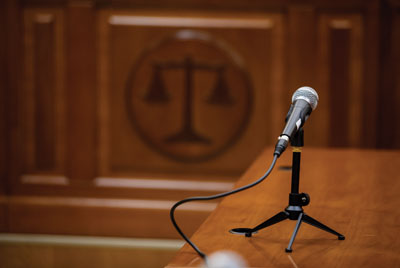Preparing For and Providing Expert Witness Testimony
By Robert J. Valas, CPA/ABV, CVA, CFE, Cullari Carrico LLC –
March 17, 2023

When a practitioner is engaged by an attorney or a client to serve as an expert witness, they need to be aware of certain professional and legal requirements in the development and preparation of their report and expert witness testimony.
Professional Standards and Nonauthoritative Guidance
The primary standard related to litigation support services is AICPA Statement on Standards for Forensic Services (SSFS) No. 1. The requirements of AICPA Statements on Standards for Valuation Services (SSVS) apply when the expert will testify on valuation related matters, such as economic damage calculations. It should be noted that paragraph .50 of SSVS Section 100 provides a reporting exemption when a valuation is performed for a matter before a court, an arbitrator, a mediator or other facilitator, or a matter in a governmental proceeding. The developmental provisions of SSVS still apply when a conclusion of value or calculated value is expressed. There are also several practice aids published by the AICPA that address various practice issues related to communications in litigation and dispute services including serving as an expert witness or consultant.
In all cases, the practitioner must comply with AICPA Professional Standards and the Code of Professional Conduct. The federal, state and local jurisdiction requirements related to the submission of expert reports and the admissibility of expert witness testimony will vary, so the practitioner should consult with client legal counsel. The practitioner, however, should be familiar with the Federal Rules of Evidence (FRE) and the Federal Rules of Civil Procedure (FRCP), especially in federal court proceedings.
Client Acceptance Considerations
Prior to accepting an engagement, the practitioner should determine the client- practitioner relationship, that is, whether his/her client is the attorney or the attorney’s client. When the client is the attorney, the work and communications of the practitioner may be privileged and protected from discovery by the opposing side. In either case, the practitioner should discuss with legal counsel prior to the commencement of work the extent to which their work and communications are protected.
The practitioner should also assess the following prior to accepting the engagement:
- Does a conflict of interest exist that could impair objectivity? Objectivity may be considered impaired when an existing or prior business relationship conflicts with the interests of the client and the ability of the practitioner to objectively provide expert witness services.
- Do they have the qualifications and ability to provide expert witness services?
- Will the attorney and/or their client restrict the scope of the practitioner’s work? A scope restriction may entail limiting access to certain information or individuals that could influence the practitioner’s judgement and preclude them from complying with professional standards. During the client acceptance process and prior to commencing work, it is important for the practitioner to be cautious in their written or verbal communications with the potential client and to avoid statements regarding the facts of the case that may be interpreted as conclusion. Such written and/or verbal statements may be subject to discovery.
Documents and Discovery
The courts have established rules for the determination of admissible evidence and expert witness testimony. The practitioner needs to carefully evaluate the documents examined and the requirements of each legal jurisdiction as it relates to reliance by the expert and the preparation of their report. Generally, the practitioner can rely on documents that have been authenticated by the parties to a proceeding or accepted by the court. However, the practitioner may want to consider stating in the written report that they have not corroborated the information.
There may also be documents provided to the practitioner that are subject to confidentiality agreements. If the confidential information is referred to in the expert report, the practitioner should consider using cautionary language in the report, such as labeling the information as confidential or subject to nondisclosure agreements. During an engagement, there will be various documents requested and received by the practitioner for consideration in the expert report. In some circumstances, all documents received need to be disclosed and in others only those documents received, read and considered in the report must be disclosed. Any documents prepared by the practitioner, including written notes taken during phone calls or meetings, may be discoverable and subject to cross-examination by the opposing side. Again, the practitioner should consult with legal counsel regarding the requirements of each legal jurisdiction.
The opinion of an expert witness can be based on fact or assumption. An assumption may also be based on facts, presumption of facts or assumptions provided by the client and/or legal counsel. The practitioner should analyze their assumptions to determine if they are reasonable. The practitioner should also prepare documentation in support of their written report, the sufficiency of which is a matter of professional judgement.
Expert Witness Report and Testimony
Not all expert witness engagements require the preparation of a written report. The practitioner should consult with client legal counsel to determine if a written report is required, including the form and content. If a written report is required, the content of the report should comply with Rule 26 of the FRCP, especially in federal court proceedings. Although the FRCP does not preclude client legal counsel from assisting the practitioner, it is important for the practitioner not to subordinate their judgement. The practitioner is not an advocate for their client but an advocate for their work product and opinion. When testifying as an expert, the practitioner must also be able to defend their report with strength and conviction. An expert witness report is not considered evidence or admissible data in a trial, therefore oral testimony will be required for a trier of fact to consider the expert’s opinion.
The opinion expressed in a written report should also comply with the FRE, especially in federal court proceedings. Rule 703 of the FRE permits an expert to rely on another expert, witness, or facts and data, provided such reliance is what other experts would reasonably rely upon in practice. Any documents relied upon by the expert should be disclosed in the report. A failure to comply with the FRE may result in the expert being disqualified as a witness or their testimony being limited or excluded entirely.
It is common for the opposing side to challenge the expert witness report and opinion through the filing of a Daubert motion. The reasons for a Daubert motion may be attributed to an expert failing to utilize methods commonly used by similar professionals, use of untested or biased data, unsupported assumptions, failure to consider material facts and other issues. The expert report must comply with the Daubert standard, as conveyed in Daubert v. Merrell Dow Pharmaceuticals, Inc., 509 U.S. 579 (1993).
Schedule and Timing of Trial
The schedule and timing of litigation is determined by the court and/or circumstances from each opposing side. The practitioner needs to understand the timing and expectations of legal counsel as it relates to the written report and expert witness testimony. The practitioner should also expect delays and adjust their schedule accordingly. These delays can last months and even years.
 | Robert J. ValasRobert J. Valas, CPA/ABV, CVA, CFE, is a partner at Cullari Carrico LLC. He is the chairperson of the NJCPA Audit Committee and is a member of the Accounting & Auditing Standards and Nonprofit interest groups. |
This article appeared in the Spring 2023 issue of New Jersey CPA magazine. Read the full issue.